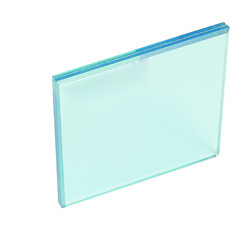Toughened glass, also called tempered glass is a strong and durable glass surface that does not break easily. Due to its capability to withstand high-temperature differentials, it is popularly used in oven doors, room partitions, glass partitions, building façades, etc. Tempered glass is at least four to five times stronger than standard annealed glass. Keep reading to find out why?
The Science Behind Toughened Glass
Tempered glass panes are made from standard glass panes that undergo a thermal tempering process. Panes of annealed glass are cut, drilled and fileted to customer specifications first. They are then passed through a 680°C preheated furnace on a roller table. This takes the glass beyond its transmission temperature and softens it. The heat-treated glass is then left to cool down. But, this surface does not cool uniformly. The outer surface of the glass cools much more rapidly, while the inside of the pane remains hot. This creates “centre tension” in the slab, altering its physical characteristics permanently and providing it with a great deal of toughness.
An important thing to consider is that the annealed glass surface must be cut to size or pressed into the desired shape before heat tempering. Once the glass has undergone the toughening process, it cannot be re-worked on. If you try to drill a hole or cut through a toughened pane of glass, it will break completely.
Should You Install Tempered Glass at Home?
Flat out yes! Toughened or tempered glass has a wealth of benefits that make it one of the safest types of glass to install at home. No wonder it is also known as safety glass! A lot of glass is used in homes today to provide an added sense of space and comfort. Toughened glass looks great and can be used for internal as well as external windows, doors, partitions, skylights, etc. Safety is paramount when it comes to fenestration. Toughened glass lets you combine security with aesthetics seamlessly. Here is a comprehensive list of pointers in support of installing tempered glass at home –
Strong and Safe
The most important reason for heat-tempering a glass pane is to provide doors, windows, and façades with the strength to combat rigorous environmental conditions, like thunderstorms, torrid rainfall, wind, dust storms, etc. Also, tempered glass is far less likely to shatter under the influence of strong winds at higher altitudes, which is why several skyscrapers and high-rise residential buildings are built using this type of glass. More importantly, in a rare and unfortunate event of its breaking, tempered glass never shatters into sharp jagged pieces. It develops countless cracks and breaks into blunt pebble-like bits that are incapable of causing any grave injuries. This makes this glass very safe, especially if you have little kids in your home.
Resistant to Heat and Humidity
Toughened glass is highly capable of enduring uncomfortably warm and humid temperatures. You can use them for shower stalls, glass partitions, basin slabs, kitchen cabinets, etc. These surfaces can happily endure a generous splash of hot water and steam. Tempered glass requires very little maintenance and retains its sheen and finish for years on end. Use a soft damp cloth to wipe it once a week.
Diverse Applications
Tempered glass is easily mouldable in a variety of creative ways. It has applications ranging from cookware to commercial buildings. Several other popular applications include frameless glass doors, table-tops, mobile phone screens, laboratory equipment, and much more. Toughened glass can also be combined with laminated glass to manufacture automotive bulletproof windows.
Several Design Options
Tempered glass can be combined with several technologies to enhance its functionality. For instance, you can choose from a range of toughened frosted surfaces, translucent surfaces, coloured, clear and engraved options for different rooms that serve different purposes at your home or office. You can also get them in various tints and shades depending on the mood you want to set in a room.
Resists Solar Damage
Solar glare can heat up exterior glass surfaces unevenly. Sometimes, one side of a building receives more sunlight than the other. Prolonged direct sun exposure expands and contracts glass surfaces, regardless of their type. Uneven absorption of sunlight makes the overall glass surface expand and contract unevenly. This difference can create stress in glass panes leading to further damage or breakage. Such a phenomenon also affects tempered glass, but these panels are adept at withstanding such a temperature differential up to 250°C.
Concluding Thoughts
Keep in mind the aforementioned benefits of toughened glass before choosing the standard annealed glass. Tempered surfaces are the ideal choice for offices, homes, schools and commercial enclaves. To bring out the best in tempered glass, count on AIS Glass. Our tempered glass is a very high-grade toughened glass, specially engineered to withstand harsh conditions. Rely on our team of experts to provide you with end-to-end services, from selection to installation, even after-sales support.
Get in touch today and enhance the safety of your home or office!

